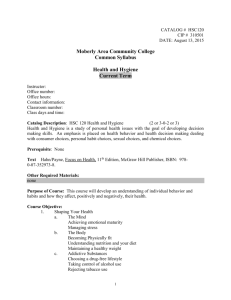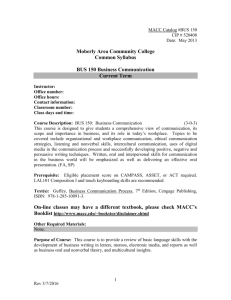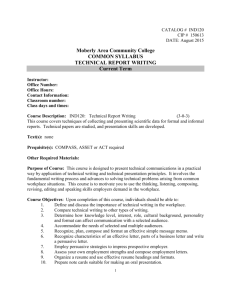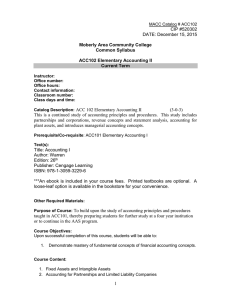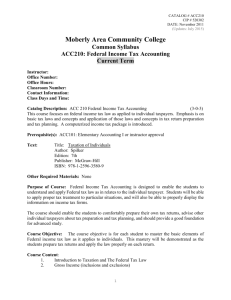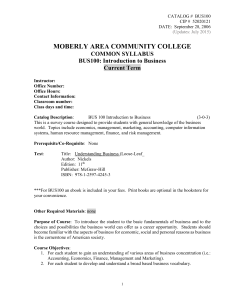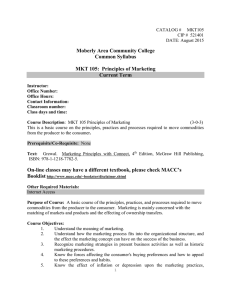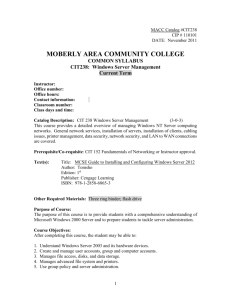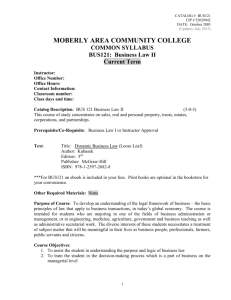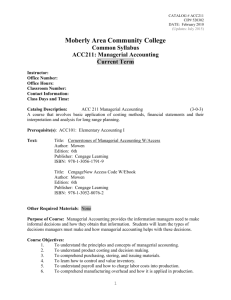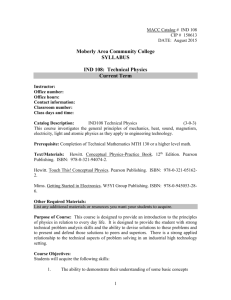Medical Terminology Syllabus - Moberly Area Community College
advertisement
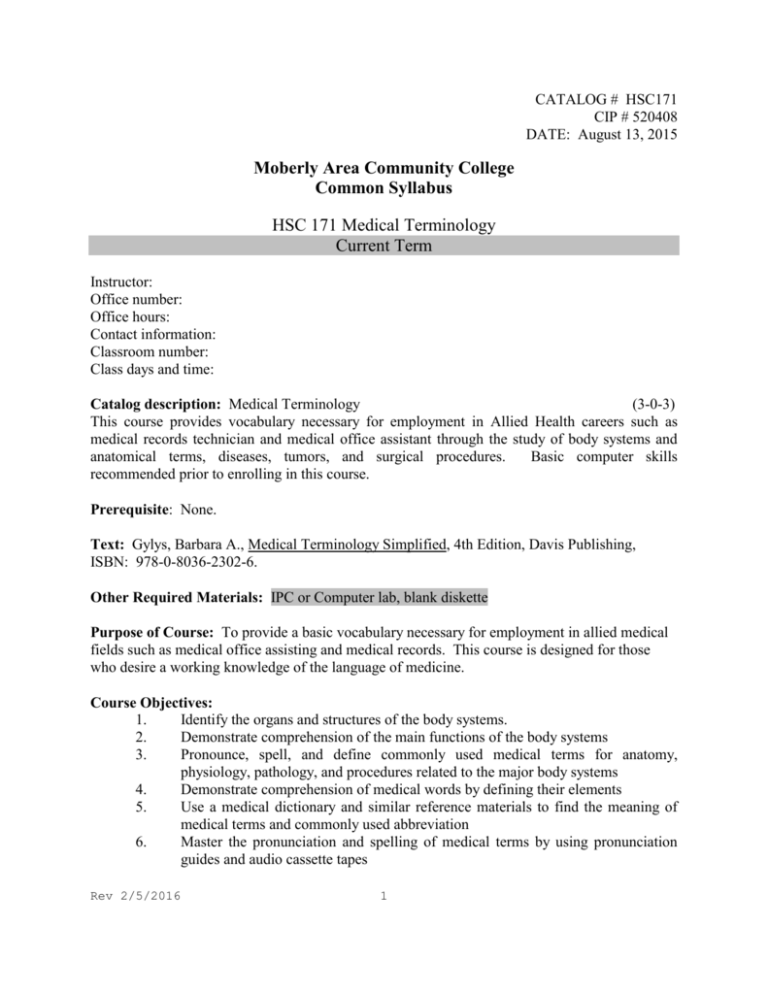
CATALOG # HSC171 CIP # 520408 DATE: August 13, 2015 Moberly Area Community College Common Syllabus HSC 171 Medical Terminology Current Term Instructor: Office number: Office hours: Contact information: Classroom number: Class days and time: Catalog description: Medical Terminology (3-0-3) This course provides vocabulary necessary for employment in Allied Health careers such as medical records technician and medical office assistant through the study of body systems and anatomical terms, diseases, tumors, and surgical procedures. Basic computer skills recommended prior to enrolling in this course. Prerequisite: None. Text: Gylys, Barbara A., Medical Terminology Simplified, 4th Edition, Davis Publishing, ISBN: 978-0-8036-2302-6. Other Required Materials: IPC or Computer lab, blank diskette Purpose of Course: To provide a basic vocabulary necessary for employment in allied medical fields such as medical office assisting and medical records. This course is designed for those who desire a working knowledge of the language of medicine. Course Objectives: 1. Identify the organs and structures of the body systems. 2. Demonstrate comprehension of the main functions of the body systems 3. Pronounce, spell, and define commonly used medical terms for anatomy, physiology, pathology, and procedures related to the major body systems 4. Demonstrate comprehension of medical words by defining their elements 5. Use a medical dictionary and similar reference materials to find the meaning of medical terms and commonly used abbreviation 6. Master the pronunciation and spelling of medical terms by using pronunciation guides and audio cassette tapes Rev 2/5/2016 1 The objectives of Medical Terminology meet the guidelines set forth for the Medical Office Assistant by the American Association of Medical Assistants. Course Content: See attached course outline Statement to Connect Course with Technical Program Outcome Statement: In compliance with MACC’s General Education outcomes, the student who successfully completes this course will be able to: I. Demonstrate effective written and oral communication; Assessment of Student Learning: The text uses a self-study technique called “programmed learning” which includes workbook exercises, CD exercises, and audio exercises. Time in class will be used for introducing new body systems and medical word elements, review of material, word drill, pronunciation practice, and group problem solving utilizing actual medical documents that the student will analyze. Students will complete self-tests outside of class. Testing will be done weekly. Computer-aided exercises will be completed weekly. Make up test days are scheduled in the course outline. No other make-up tests will be given. GRADING: A point system is utilized for each of the weighted course components. The percentage of points determines the grade earned. Component weights are as follows: Spelling tests: 40% Unit Tests: 30% Mid-Term 10% Final 20%. Grading scale 93 -100% = A 83 - 92% = B 73 - 82% = C 65 - 72% = D Below 65% = Failure Description of Major Assignment(s)/Project(s): Completion of lab workbook and CD exercises, field trip to a transcription department or other medical setting to view actual work practices Program Assessment: The Business and Office Technology faculty continually strive to meet the needs of their students through program improvements. These improvements are a result of program assessments and the consultation and advisement of the BOT Advisory Committee. In addition to the course assessments outlines in this syllabus, the objectives achieved in this course will also be an integral part of the Business and Office Technology program assessment. Students will be assessed on the mastery of course concepts and essential skills attained in this course during the capstone course, Administrative Office Procedures. Rev 2/5/2016 2 Instructor Policies: Academic Dishonesty: MACC board policy is as follows: “Academic dishonesty by students damages institutional credibility and unfairly jeopardizes honest students; therefore, it will not be tolerated in any form.” Forms of academic dishonesty include but are not limited to the following: violations of copyright law, plagiarism, fabrication, cheating, collusion, and other academic misconduct. Incidents of dishonesty regarding assignments, examinations, classroom/laboratory activities, and/or the submission of misleading or false information to the College will be treated seriously. The procedure for handling academic dishonesty is outlined in the Student Handbook (Policy Handbook M.010). In cases of alleged academic dishonesty, the burden of proof is on the student, not on the instructor. Attendance: Any student who misses two consecutive weeks of class during a regular sixteen-week semester or the equivalent proportion of class time during a shorter session will be dropped from the class by the instructor unless acceptable justification is supplied. Additionally, any student who misses more than one-fourth of the entire number of in-seat class meetings in a regular 16-week semester or the equivalent proportion of class time during a shorter session, may be dropped from that class by the instructor if, in the opinion of the instructor, the student does not have reasonable opportunity to succeed in the class. A student’s attendance rate will be calculated based upon the first day of the semester (not the student’s date of enrollment in the course). Student attendance must be defined in a different manner for online, hybrid, and virtual courses. Student attendance in these courses is defined as active participation in the course. Online, hybrid, and virtual courses will, at a minimum, have weekly mechanisms for student participation, such as any or all of the following methods: a. Completion of quizzes or exams b. Submission of assignments c. Participation in threaded discussions d. Communication with the instructor A student who does not participate in an online, hybrid, or virtual course for two consecutive weeks will be dropped by the instructor unless acceptable justification is supplied. As with ground courses, a student’s attendance rate in online courses will also be calculated based upon the first day of the semester. If a student does not demonstrate active participation in the online course within the first two weeks (or the equivalent proportion of class time during a short session), the student will be dropped as “never attended.” Simply logging into an online class does not constitute active participation. Students should be aware that their dropping a course and their last date of attendance in the course may impact their financial aid. Tardiness: Make-up and late work: Rev 2/5/2016 3 Extra-Credit: Schedule of Student Assignment and Activities: ADA Statement Students who have disabilities that qualify under the Americans with Disabilities Act may register for assistance through the Office of Access and ADA Services. Students are invited to contact the Access Office to confidentially discuss disability information, academic accommodations, appropriate documentation and procedures. For more information, please call either the Moberly office at (660) 263-4100 x 11240 or the Columbia office at (573) 234-1067 x 12120, or visit our web page at http://www.macc.edu/index.php/services/access-office. Title IX Statement MACC maintains a strict policy prohibiting sexual misconduct in any form, including sexual harassment, sexual discrimination, and sexual violence. All MACC employees, including faculty members, are considered mandated reporters of sexual misconduct and as such are expected to contact the Title IX Coordinator when they become aware, in conversation or in writing, of an incident of sexual misconduct. For more information on this policy or to learn about support resources, please see http://www.macc.edu/sexual-misconduct-policy or contact Dr. Jackie Fischer, MACC’s Title IX Coordinator, at 660-263-4110, ext. 11236 or jackief@macc.edu. Rev 2/5/2016 4
